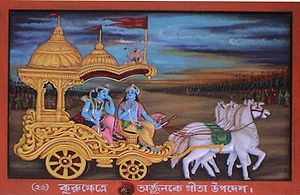No other text could have explained it better than Bhagvad Gita’s below mentioned verse:-
“Karmanyevadhikaraste ma phaleysu kadachanaa
Maa karmphalheyturbhurma tey sangoustvakarmani”
“To work alone is under our control, but not its fruits
(results), Neither our motive should be just the results,
nor should be attached to inaction”
This sacred scripture from the holy book Srimad Bhagvad Gita is the most confusing text of Hindu Philosophy. If understood and practiced religiously- this text can bring wonders to the life of an individual, on the other hand if it is perceived wrongly it can even be a reason for disasters in ones life.
It is most of the times interpreted as a scripture which advocates working without expecting any results. As the results are not under our control, we should just work without worrying too much about the results. When one does his actions misinterpreting this text from Bhagvad Gita, there are very high chances of his attitude becoming too casual in his work. When we do something without focussing on our goals, we are likely to fail in our mission of achieving those goals. For every work (karma) there has to be a purpose to serve and any action without a purpose is not worth it. It is often assumed that this philosophy of working is unproductive as it is not result oriented.
On the contrary, the truth is entirely different. This text is one of the most precious gems of the treasure Bhagvad Gita- as it not only promotes action to achieve a goal but also teaches us how to get rid of negative emotions like worries, stress and even frustration at times of failure. Following are some of the reasons of a man’s failure various assignments of his life:-
- Inability to act
- Fear of Failure
- Procrastination because of fear of failure
- Frustration because of previous failures in life.
We fail because either we do not act most of the times because of our fear of failure or we try to procrastinate things as we are so much attached to the goals that we want first to ensure removal of all the obstacles before we act towards achieving those goals. Sometimes we even fail to act because of our high frustration levels raised from our failure in past. The verse mentioned above lays stress on doing our actions without fear of failure. We should try out best in the right direction to achieve our goals, but we should not be afraid of failures. We should not be attached to the results of our mission so much that thoughts of its failure haunts us even before starting the mission. It is clearly stated in the verse, which is true also those actions are in our control but results are not.
Meeting our goals, targets depends mainly on three things:-
- Our attitude to work
- Our knowledge/skill of the work
- External conditions
Although our attitude and skills play 80% of the role in the achievement of any goal, but balance 20% for external conditions should be not ignored. This also many times is defined as our destiny. We have control over our attitude and our sills to work. Thus we have 100% control over our actions and we should utilise maximum of this control by doing our actions and not leaving any stone unturned to achieve our goals. But we have almost no control over external conditions, which can also be a deciding factor in turning our success into failure and making us a failure in achieving our goals in spite of best of our actions.
Thus on one hand we must understand the importance of our karma (actions) and try our best to not to surrender till last moment, on the other hand we should not be too much attached to the results of our action and must not be afraid of failures. Instead of being afraid of our failures, one must attempts to learn from his failures to manifest excellence in future assignments of his life.




Trackbacks/Pingbacks